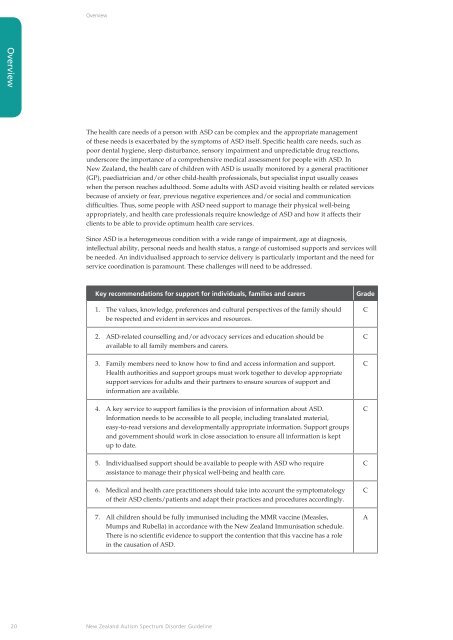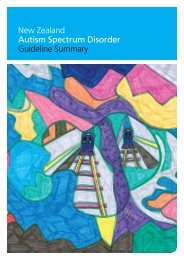New Zealand Autism Spectrum Disorder Guideline - Ministry of Health
New Zealand Autism Spectrum Disorder Guideline - Ministry of Health
New Zealand Autism Spectrum Disorder Guideline - Ministry of Health
You also want an ePaper? Increase the reach of your titles
YUMPU automatically turns print PDFs into web optimized ePapers that Google loves.
Overview<br />
Overview<br />
The health care needs <strong>of</strong> a person with ASD can be complex and the appropriate management<br />
<strong>of</strong> these needs is exacerbated by the symptoms <strong>of</strong> ASD itself. Specific health care needs, such as<br />
poor dental hygiene, sleep disturbance, sensory impairment and unpredictable drug reactions,<br />
underscore the importance <strong>of</strong> a comprehensive medical assessment for people with ASD. In<br />
<strong>New</strong> <strong>Zealand</strong>, the health care <strong>of</strong> children with ASD is usually monitored by a general practitioner<br />
(GP), paediatrician and/or other child-health pr<strong>of</strong>essionals, but specialist input usually ceases<br />
when the person reaches adulthood. Some adults with ASD avoid visiting health or related services<br />
because <strong>of</strong> anxiety or fear, previous negative experiences and/or social and communication<br />
difficulties. Thus, some people with ASD need support to manage their physical well-being<br />
appropriately, and health care pr<strong>of</strong>essionals require knowledge <strong>of</strong> ASD and how it affects their<br />
clients to be able to provide optimum health care services.<br />
Since ASD is a heterogeneous condition with a wide range <strong>of</strong> impairment, age at diagnosis,<br />
intellectual ability, personal needs and health status, a range <strong>of</strong> customised supports and services will<br />
be needed. An individualised approach to service delivery is particularly important and the need for<br />
service coordination is paramount. These challenges will need to be addressed.<br />
Key recommendations for support for individuals, families and carers<br />
1. The values, knowledge, preferences and cultural perspectives <strong>of</strong> the family should<br />
be respected and evident in services and resources.<br />
2. ASD-related counselling and/or advocacy services and education should be<br />
available to all family members and carers.<br />
3. Family members need to know how to find and access information and support.<br />
<strong>Health</strong> authorities and support groups must work together to develop appropriate<br />
support services for adults and their partners to ensure sources <strong>of</strong> support and<br />
information are available.<br />
4. A key service to support families is the provision <strong>of</strong> information about ASD.<br />
Information needs to be accessible to all people, including translated material,<br />
easy‐to-read versions and developmentally appropriate information. Support groups<br />
and government should work in close association to ensure all information is kept<br />
up to date.<br />
5. Individualised support should be available to people with ASD who require<br />
assistance to manage their physical well-being and health care.<br />
6. Medical and health care practitioners should take into account the symptomatology<br />
<strong>of</strong> their ASD clients/patients and adapt their practices and procedures accordingly.<br />
7. All children should be fully immunised including the MMR vaccine (Measles,<br />
Mumps and Rubella) in accordance with the <strong>New</strong> <strong>Zealand</strong> Immunisation schedule.<br />
There is no scientific evidence to support the contention that this vaccine has a role<br />
in the causation <strong>of</strong> ASD.<br />
Grade<br />
C<br />
C<br />
C<br />
C<br />
C<br />
C<br />
A<br />
20<br />
<strong>New</strong> <strong>Zealand</strong> <strong>Autism</strong> <strong>Spectrum</strong> <strong>Disorder</strong> <strong>Guideline</strong>











